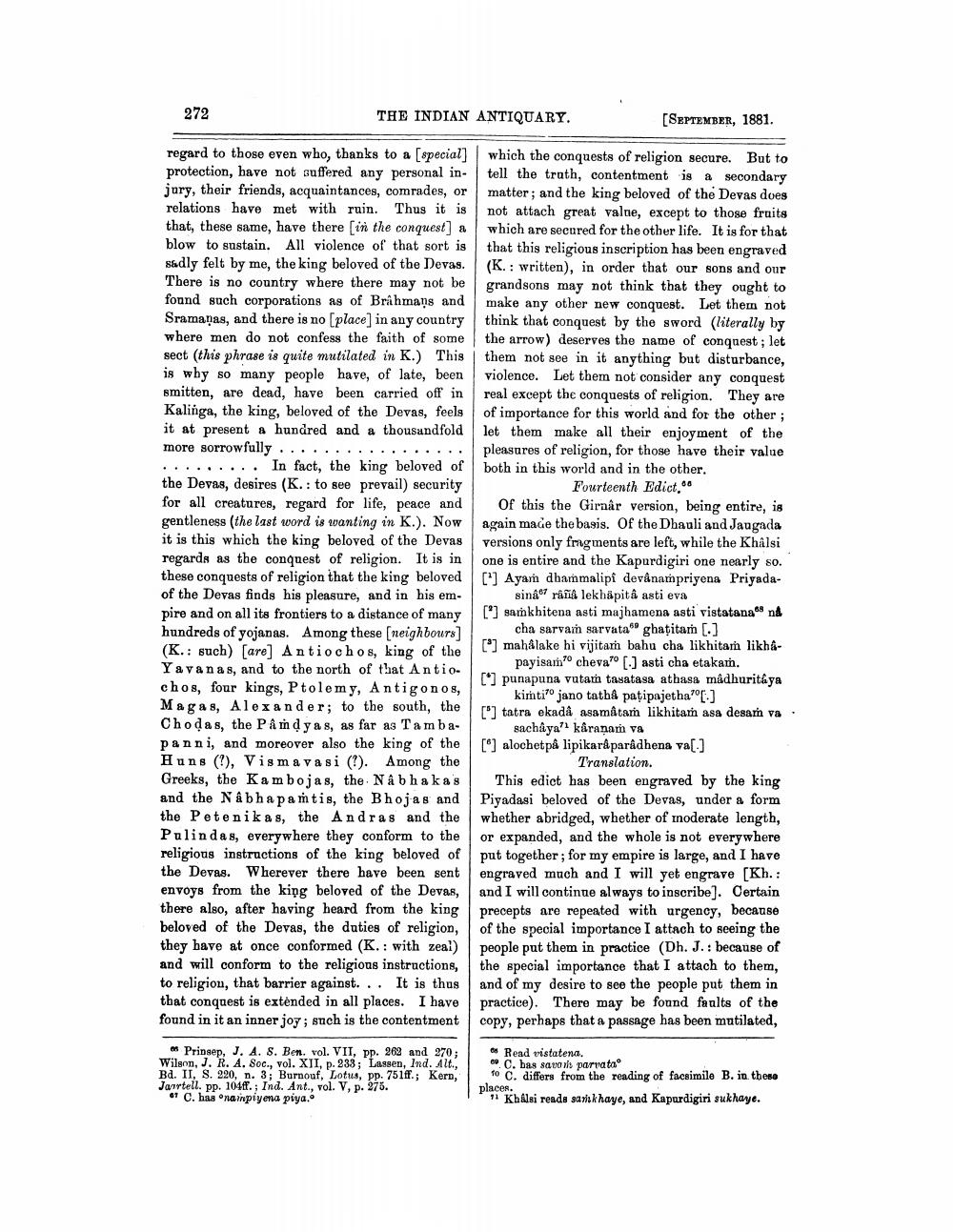________________
272
THE INDIAN ANTIQUARY.
regard to those even who, thanks to a [special] protection, have not suffered any personal injury, their friends, acquaintances, comrades, or relations have met with ruin. Thus it is that, these same, have there [in the conquest] a blow to sustain. All violence of that sort is sadly felt by me, the king beloved of the Devas. There is no country where there may not be found such corporations as of Brahmans and Sramaņas, and there is no [place] in any country where men do not confess the faith of some sect (this phrase is quite mutilated in K.) This is why so many people have, of late, been smitten, are dead, have been carried off in Kalinga, the king, beloved of the Devas, feels it at present a hundred and a thousandfold more sorrowfully. . . .
In fact, the king beloved of the Devas, desires (K.: to see prevail) security for all creatures, regard for life, peace and gentleness (the last word is wanting in K.). Now it is this which the king beloved of the Devas regards as the conquest of religion. It is in these conquests of religion that the king beloved of the Devas finds his pleasure, and in his empire and on all its frontiers to a distance of many hundreds of yojanas. Among these [neighbours] (K.: such) [are] Antiochos, king of the Yavanas, and to the north of that Antiochos, four kings, Ptolemy, Antigonos, Magas, Alexander; to the south, the Chodas, the Pâmḍyas, as far as Tambapanni, and moreover also the king of the Huns (?), Vismavasi (?). Among the Greeks, the Kambojas, the Nâbhakas and the Nabhapamtis, the Bhojas and the Petenikas, the Andras and the Pulindas, everywhere they conform to the religious instructions of the king beloved of the Devas. Wherever there have been sent envoys from the king beloved of the Devas, there also, after having heard from the king beloved of the Devas, the duties of religion, they have at once conformed (K.: with zeal) and will conform to the religious instructions, to religion, that barrier against... It is thus that conquest is extended in all places. I have found in it an inner joy; such is the contentment
es Prinsep, J. A. S. Ben. vol. VII, pp. 262 and 270; Wilson, J. R. A. Soc., vol. XII, p. 233; Lassen, Ind. Alt., Bd. II, S. 220, n. 3; Burnouf, Lotus, pp. 751ff.; Kern, Jartell. pp. 104ff.; Ind. Ant., vol. V, p. 275.
61 C. has naimpiyena piya.
[SEPTEMBER, 1881.
which the conquests of religion secure. But to tell the truth, contentment is a secondary matter; and the king beloved of the Devas does not attach great value, except to those fruits which are secured for the other life. It is for that that this religious inscription has been engraved (K.: written), in order that our sons and our grandsons may not think that they ought to make any other new conquest. Let them not think that conquest by the sword (literally by the arrow) deserves the name of conquest; let them not see in it anything but disturbance, violence. Let them not consider any conquest real except the conquests of religion. They are of importance for this world and for the other; let them make all their enjoyment of the pleasures of religion, for those have their value both in this world and in the other.
Fourteenth Edict,"
Of this the Girnar version, being entire, is again made the basis. Of the Dhauli and Jaugada versions only fragments are left, while the Khâlsi one is entire and the Kapurdigiri one nearly so. [] Ayam dhammalipî devânampriyena Priyada
sinâ râñâ lekhäpitâ asti eva
[2] samkhitena asti majhamena asti vistatanas nå cha sarvam sarvata ghatitam [.]
[3] mahâlake hi vijitam bahu cha likhitam likhapayisam cheva [.] asti cha etakam. [*] punapuna vutam tasatasa athasa mâdhuritâya kimti jano tatha pațipajetha"[.]
[] tatra ekadâ asamâtam likhitam asa desam va sachâya karanam va
[] alochet på lipikarâparâdhena va[:]
Translation.
This edict has been engraved by the king Piyadasi beloved of the Devas, under a form whether abridged, whether of moderate length, or expanded, and the whole is not everywhere put together; for my empire is large, and I have engraved much and I will yet engrave [Kh.: and I will continue always to inscribe]. Certain precepts are repeated with urgency, because of the special importance I attach to seeing the people put them in practice (Dh. J.: because of the special importance that I attach to them, and of my desire to see the people put them in practice). There may be found faults of the copy, perhaps that a passage has been mutilated,
Read vistatena.
C. has savas parvata
10 C. differs from the reading of facsimile B. in these places.
71 Khálsi reads samkhaye, and Kapurdigiri sukhaye.




